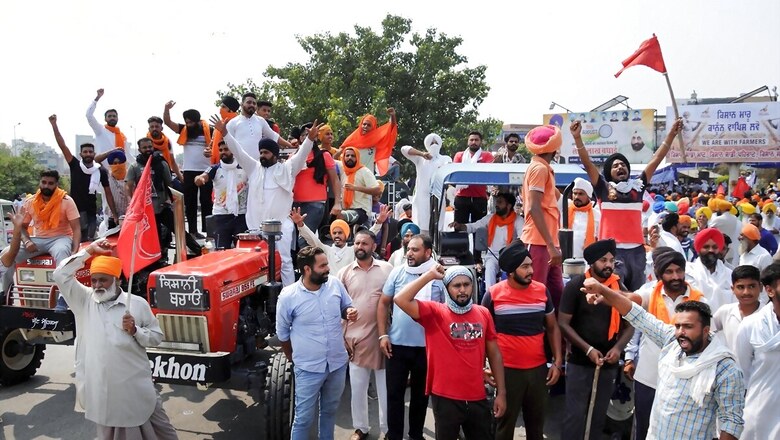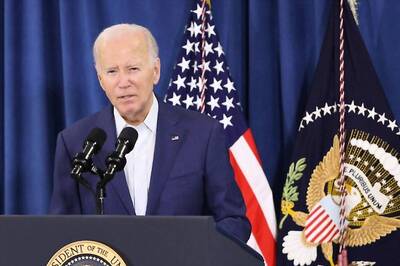
views
Protests rocked several states on Friday as farmers and political parties took to the streets to oppose the three agricultural marketing Bills passed by the Parliament earlier this week. Farmers in several parts of the country raised slogans, took out processions, and blocked roads and railway lines as part of the Bharat bandh call given by a number of unions to voice dissent against the Bills perceived as “anti-farmer”.
In Punjab, the day-long protests by farmers evoked a huge response and normal life was disrupted. Over 30 organisations had given a separate Punjab bandh call, leading to farmers blocking roads and traders shutting shops and vegetable markets for the day. The bandh in the state appeared to be near total. However, Chandigarh remained the least affected.
A three-day ‘rail roko’ that began on Thursday is underway in Punjab as well, with farmers squatting on the tracks at many places and the Railways suspending trains. The Kisan Mazdoor Sangharsh Committee on Friday announced its extension until September 29. Buses run by state-owned Pepsu Road Transport Corporation also remained off the roads on Friday.
Reports of shutdown of shops and other establishments were received from Patiala, Ludhiana, Bathinda, Moga, Hoshiarpur, Jalandhar and other cities. Shiromani Akali Dal (SAD) chief Sukhbir Singh Badal demanded that all of Punjab be declared a ‘principal market yard’ for agricultural produce to ensure laws based on the three Bills do not apply.
In neighbouring Haryana, farmers blocked the Karnal-Meerut, Rohtak-Jhajjar and Delhi-Hisar and other roads.
Hundreds of farmers were stopped at Delhi’s border with Uttar Pradesh as they tried to press ahead into the national capital, their agitation disrupting traffic in Noida and Ghaziabad. Stopped from entering the city, the farmers staged ‘panchayats’ at the road blockades where they were addressed by Bhartiya Kisan Union (BKU) office-bearers.
Farmers also blocked the Ayodhya-Lucknow highway and Delhi-Meerut highway for a few hours on Friday. Protests were also reported from the UP districts of Lakhimpur Kheri, Pilibhit, Sambhal, Sitapur, Baghpat and Barabanki.
Despite lockdown in several districts of Chhattisgarh, farmers staged demonstrations outside their houses and fields in various villages and towns. Farmers under the aegis of 25 unions, including Chhattisgarh Kisaan Majdoor Mahasangh (CKMM), held protests in over 100 villages and towns demanding withdrawal of the Bills, legal guarantee to Minimum Support Price (MSP) for crops, and enactment of a law to sell crops within and outside mandis at MSP.
In Maharashtra, the agitation found support of the Congress, Nationalist Congress Party, All India Kisan Sabha, Swabhimani Shetkari Sanghatana, major farmers’ organisations, national and state-level trade unions and student unions, who led the protesters in Mumbai, Thane, Jalna, Nanded and Kolhapur among other districts.
The farmers’ issue turned political in poll-bound Bihar as Rashtriya Janata Dal (RJD) leader Tejashwi Yadav, with his party supporters, led a procession of around 50 tractors, with agitators shouting slogans against the NDA government. The protesters, without following social distancing norms, were headed towards the Governor’s House when a posse of police briefly stopped them for security reasons. They were, however, allowed to proceed towards Bailey Road.
In West Bengal, the Communist Party of India-Marxist (CPI-M) farmers wing ‘Sara Bharat Krishak Sabha’ and Trinamool-backed Kisan Khet Mazdoor cell activists staged protests. Rallies were held in Hooghly, Murshidabad, North 24 Parganas, Bankura and Nadia. SFI activists also staged a road blockade in front of Kolkata’s prestigious Jadavpur University in the afternoon protesting against the farm bills.
CPI(M)-led Left parties organised protest rallies of farmers in different northeastern states including Assam and Tripura. Addressing a rally in Agartala, CPI-M central committee member Badal Chowdhury said if the farm Bills were enforced, crores of farmers and farm labourers would lose their work and jobs. “Farmers suicide and mass death of farmers and farm labourers would increase due to these destructive and harmfull bills,” Chowdhury, a former Left Minister in Tripura, told the gathering.
Down south, Karnataka, Tamil Nadu and Kerala witnessed scattered agitation against the Bills.
Karnataka witnessed several demonstrations and farmers arrived in capital Bengaluru to take part in protests against amendments to the Agricultural Produce Marketing Committee Act and the Karnataka Land Reforms Act. However, some discord among farmers associations was visible as farmer leader Kodihalli Chandrashekhar asserted that their group did not support Friday’s protest even as another leader Kuruburu Shantakumar said that there are as many as 60 entry points across Bengaluru.
In neighbouring Tamil Nadu, farmers led by Tamil Nadu Farmers’ Association President P Ayyakannu, held their protest outside the Collectorate in Trichy while carrying human skulls in their hands. They demanded that the Bills should not be signed into law by President Ram Nath Kovind. However, Agriculture Minister R Doraikkannu said the Bills will not impact the state’s farmers.
The Farmer’s Produce Trade and Commerce (Promotion and Facilitation) Bill, 2020, the Farmers (Empowerment and Protection) Agreement of Price Assurance and Farm Services Bill, 2020 and the Essential Commodities (Amendment) Bill, 2020, now await presidential assent.




















Comments
0 comment